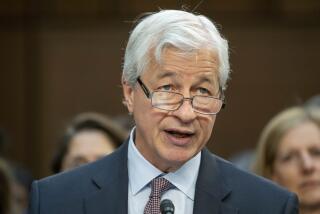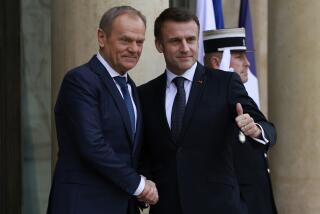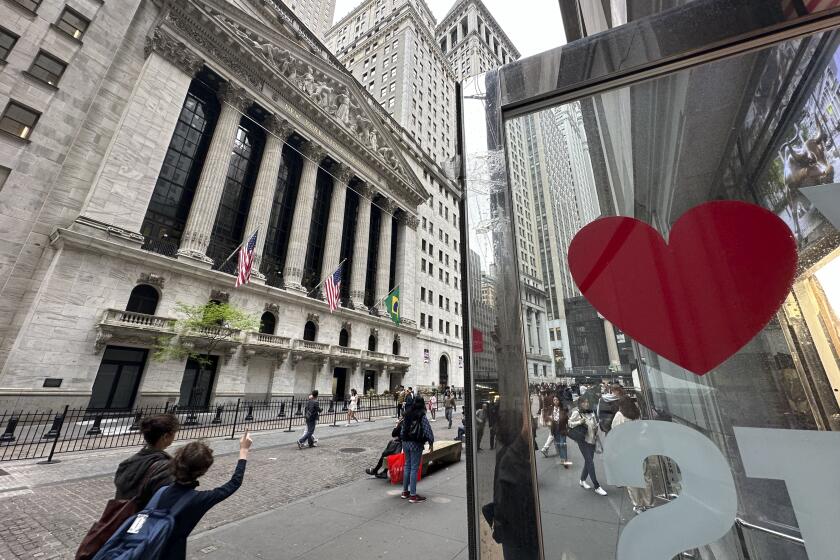Germans Join French in Moves to Bolster Franc : Finance: Concern grows over major nations’ ability to control economies. Hopes dim for interest cuts.
The French and German governments took drastic action Wednesday to bolster the French franc as global financial markets continued to roil amid growing concern about the ability of major nations to control their economies.
Wednesday’s developments demonstrated that the calm predicted last weekend when French voters narrowly approved a treaty that would unite Europe’s economies has not materialized. They also discouraged hopes that interest rates in Europe will drop--a move that would give the U.S. Federal Reserve flexibility to lower rates again to spur the domestic economy.
A wild day in financial markets was marked by these developments:
* The French government jacked up short-term interest rates by a whopping 2.5 percentage points in a desperate attempt to prevent the franc from becoming the latest casualty of Europe’s currency wars. France and Germany also announced that they would continue to intervene in international currency markets to support the franc’s value against the mighty German mark.
France’s move, experts said, underscored how currency traders have frustrated attempts by Europe’s central banks to manage their currencies and prop up the shaky European Monetary System, which was created 13 years ago to stabilize exchange rates among the 12-nation European Community.
* The dollar tumbled to a new low against the Japanese yen, finishing at 120.15 yen in New York. In trading today in Tokyo, the dollar opened at 119.90 yen but recovered to close the morning session at 121.05 yen.
Despite Japan’s economic woes, the yen has strengthened because investors view it as a haven from Europe’s currency chaos, as well as from the political and economic uncertainties in the United States. Traders also said they sold dollars following apathetic statements by U.S. officials about the dollar’s weakening against the yen. The dollar was mixed against European currencies.
* U.S. Treasury Secretary Nicholas F. Brady, responding to the instability in the currency markets and the increasing globalization of the world’s economy, urged that the world’s major economic powers launch a study of global capital flows and how they affect the world’s monetary system. Foreign exchange market transactions now approach $1 trillion each day.
In France, the franc initially rose in value on the news of the joint Franco-German strategy. It seesawed for hours, but at the end of the European trading day it showed a modest rise as the French and German central banks dove into the market, buying francs and selling marks.
Still, many traders predicted that no amount of government intervention could ultimately prevent a devaluation of the French currency. Edgar Peng, head of currency trading operations for Credit Suisse, one of Switzerland’s biggest banks, called the Franco-German strategy “ridiculous.” When it ultimately fails, he said, international investors will have profited by millions of dollars, at the expense of the French and German central banks.
French Finance Minister Michel Sapin criticized investors who are betting on a devaluation of the franc even though the French economy is relatively robust.
“During the (French) revolution, such people were known as speculators, and they were beheaded,” he said. “We must make the speculators pay. When you raise overnight interest rates, you hit them where it hurts: in their wallets.”
But in the last two weeks, investors have profited by selling three European currencies--the British pound, the Italian lira and the Spanish peseta--before they were devalued.
“Investors have done well betting against Europe’s weaker currencies,” said Jim O’Neill, head of currency research for Swiss Bank Corp. in London. “Now they’re looking for more, and they have a lot of profits to invest.”
France and Germany mounted their defense of the franc exactly one week after Britain boosted rates by five percentage points in a futile effort to protect the pound. Within hours, Britain yanked the pound out of the system of fixed exchange rates among the currencies of 11 European Community nations; the pound has since lost about 9% of its value against the mark.
The pound was hurt by the sorry shape of the British economy, which is in its third year of recession. France, by contrast, has one of Europe’s more vigorous economies, and Germany, which did not go out of its way to support the pound, is rallying to the franc’s defense.
“Under these circumstances, the collapse of the franc would mean the end of the European Monetary System,” O’Neill of Swiss Bank said. The European Monetary System, which fixes exchange rates among currencies of EC nations, is designed to guarantee cross-border investors in Europe that their profits will not be lost to currency fluctuations.
The Bank of France announced Wednesday that it was raising from 10.5% to 13% the interest it charges on emergency short-term loans to commercial banks. Higher interest rates are designed to bolster demand for a currency--and therefore its value--by making investments in that currency more profitable.
Last week, the Bank of England raised interest rates an astounding five percentage points but later dropped them. Sweden for a time raised a key interest rate to 500%.
On Wednesday, the central banks and finance ministers of France and Germany issued a statement that there was no justification for a devaluation of the franc. The current exchange rates between the French and German currencies, the statement declared, “correctly reflect the real situation of their economies.”
The announcement of the Franco-German strategy came the morning after a meeting in Paris between French President Francois Mitterrand and German Chancellor Helmut Kohl, who discussed how to rescue their campaign for a more united Europe.
By a thin majority of 51% to 49%, French voters Sunday ratified the Maastricht Treaty, which would create a common EC currency by 1999. The prospect that France would defeat the treaty had contributed to last week’s upheaval in Europe’s currency markets; the narrowness of the vote for the treaty has done little to calm the markets.
As intended, Wednesday’s Franco-German announcement promptly lifted the value of the franc in relation to the mark. The franc opened the trading day at 0.292 marks but rose to 0.295 marks within minutes of the announcement. The franc then gradually slipped back to 0.293 marks, but above the floor for staying within the range of the European exchange rate system.
Havemann reported from Brussels; Bates reported from Los Angeles.
Franc vs. Mark
Despite the downward pressure on the French franc, the French economy by many measures is in better shape than Germany’s.
France Germany Economic growth rate, 1992: 2.0% 1.3% Inflation (last 12 months): 2.8% 3.3% Budget deficit, as share of economic output, 1992: 2.3% 3.4% Unemployment rate, 1992: 9.8% 4.7% Interest rate, three-month government bill: 10.3% 9.4%
Sources: Organization for Economic Cooperation and Development, Eurostat, Bank Brussels Lambert






